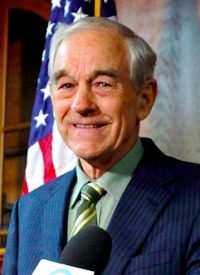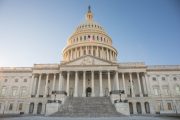
In his 2008 presidential race, Paul drew a passionate, mostly youthful following that demonstrated energy and fundraising prowess but never broke into the top tier of candidates in primaries when measured in ballots. The novice campaign had organizational problems, but the main problem for Paul may have been the timing of his campaign issues. He floundered in the primaries in early 2008 as he warned that a severe recession was coming, even as the incumbent President Bush and nearly all in the GOP primary field asserted that the economy was on a solid foundation. By the time the recession fully hit the nation and Paul's predictions had been proven correct, Senator John McCain had already locked up the Republican nomination. Moreover, Paul's non-interventionist foreign policy grated on GOP loyalists; his calls for ending the wars in Iraq and Afghanistan came as President Bush waged a "surge" in Iraq that appeared to be working and before Afghanistan fell apart.
While some establishment politicians have panned the potential of a Ron Paul presidential campaign as a repeat of 2008, most observers see him as a serious candidate for 2012. Michael D. Shear of the New York Times wrote April 26 that "the blunt congressman might wield more influence over the shape, direction and conversation of the Republican contest this time around." The prime reason for that is because, "as a potential candidate, Mr. [sic] Paul has a larger national profile in 2011 than he did in 2007, when he began running for the Republican nomination as a largely unknown lawmaker. His important issues — concern about federal debt, spending, and the size of government — are front and center this year." In sum, just about everything that Ron Paul has been predicting for a decade has come true and more people are taking notice.
That Ron Paul has tremendous potential to escape his narrow results in 2008 is backed up by Tom Jenson of Public Policy Polling, who on April 26 posted an analysis of Paul's popularity entitled "Don't laugh at Ron Paul": "In Iowa Paul's net favorability with GOP voters is +38 at 55/17. The only Republican more popular with the base than that in the state is Mike Huckabee. Paul's numbers trump Tim Pawlenty (+32), Mitt Romney (+30), Sarah Palin (+29), and Newt Gingrich (+21) as well as a cadre of other less well known candidates."
Ron Paul's presidential campaign in 2008 saw less than a handful of his colleagues in Congress endorse him. That population of officeholders endorsing the Ron Paul campaign in 2012 will increase dramatically in the post-Tea Party revolution era, as Paul's supporters funded dozens of winning Tea Party-linked candidates during the 2010 election cycle. Among that group is Ron Paul's son, Freshman Kentucky Senator Rand Paul, who has catapulted into national prominence as the best-known face of the Tea Party in 2011. Many see Rand Paul as a potential presidential candidate as well, but he has pledged not to run against his father. But much of Rand Paul's popularity may spill over into his father's campaign this time around.
Ron Paul's biggest hurdle may be to win the Republican nomination, as his opposition to military adventurism abroad is unpopular with some GOP voters. This would likely help him win independent voters and even some Democrats in a general election, however. Now serving his 12th term in Congress, Ron Paul's consistent voting record on behalf of constitutional principles and his willingness to forge alliances across the political aisle on single issues have won him respect even among some liberals and socialists. Among the co-sponsors of his bill to audit the Federal Reserve in the last Congress was not only every Republican member of the House, but also many of the most liberal members of Congress, such as Florida's Alan Grayson, Wisconsin's Tammy Baldwin, Ohio's Dennis Kucinich, and even self-described socialist Vermont Senator Bernie Sanders. Paul even allied with leftist Massachusetts Democrat Barney Frank in an effort to trim U.S. defense spending.
The ability to form principled alliances may mean Ron Paul has a better chance of winning in November than any other Republican. The question is, can he convince GOP primary voters of this?
Congressman Paul has also given a hint of the kind of guerrilla campaign he will wage in 2012. Antiwar Radio's Scott Horton April 23 requested this of a Paul presidential campaign: "Please let the kids — the YouTube kids — make the TV ads…. All of the very best Ron Paul ads from 2007 and 2008 were made by your fans. And they were just clips of your speeches and TV appearances, put together with a little … music. Why not just hold YouTube contests and let the kids make the ads? What do you think?"
Paul responded: "You get an A+ for that suggestion. I agree with you 100 percent. And there's been some discussion if there is a campaign, that is the direction I want to go in. Because resorting to some of the conventional people because they've been experts, that doesn't fit us. We don't have a conventional campaign, and therefore I think what you suggest is very good."
The Texas congressman formerly served as an obstetrician who delivered some 4,000 babies. He said he would formally announce whether to run for President "in the month of May." Dr. Paul noted that part of his decision to form an exploratory committee at this time was so that he could participate in the May 5 debate in South Carolina.
Photo of Ron Paul: AP Images

